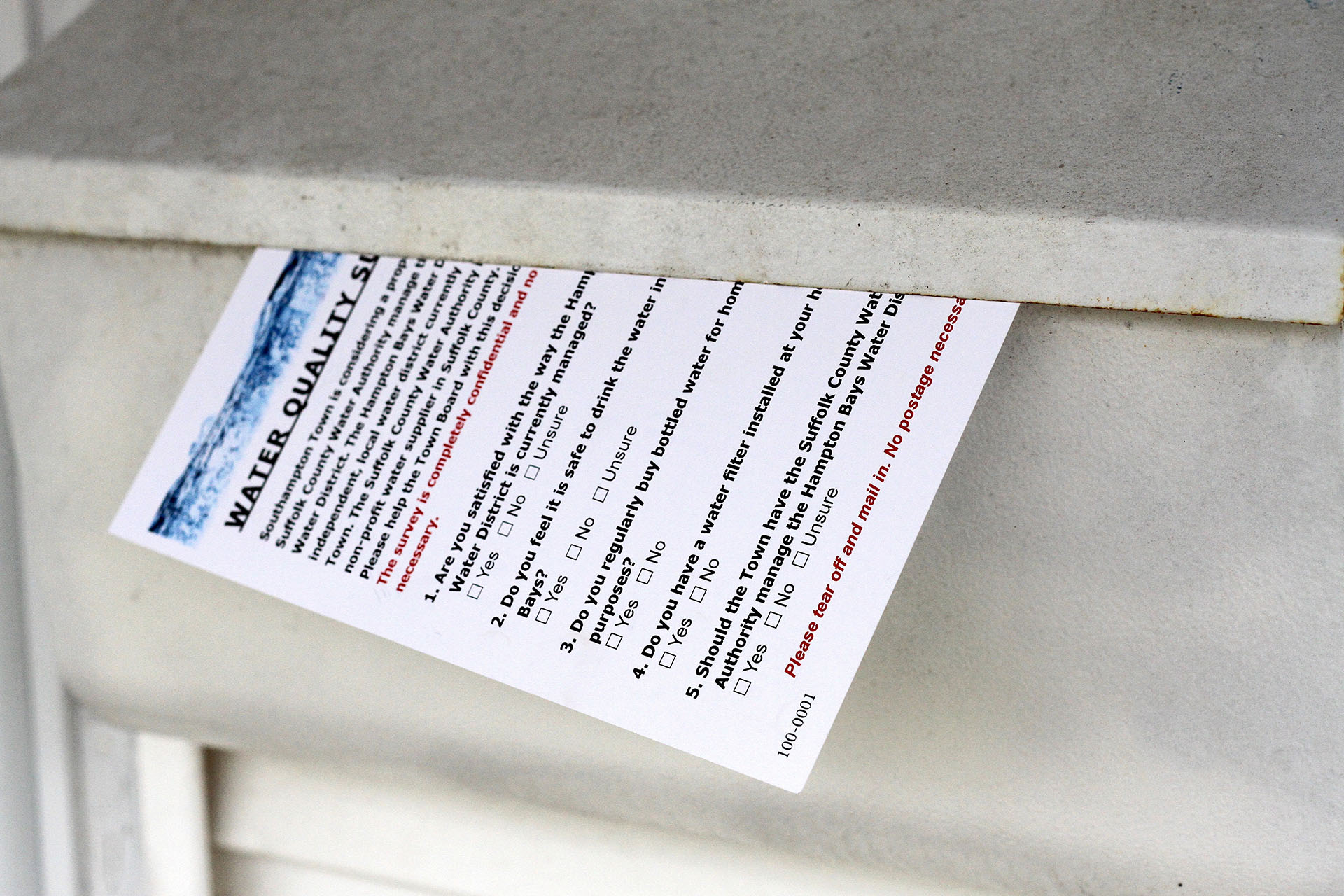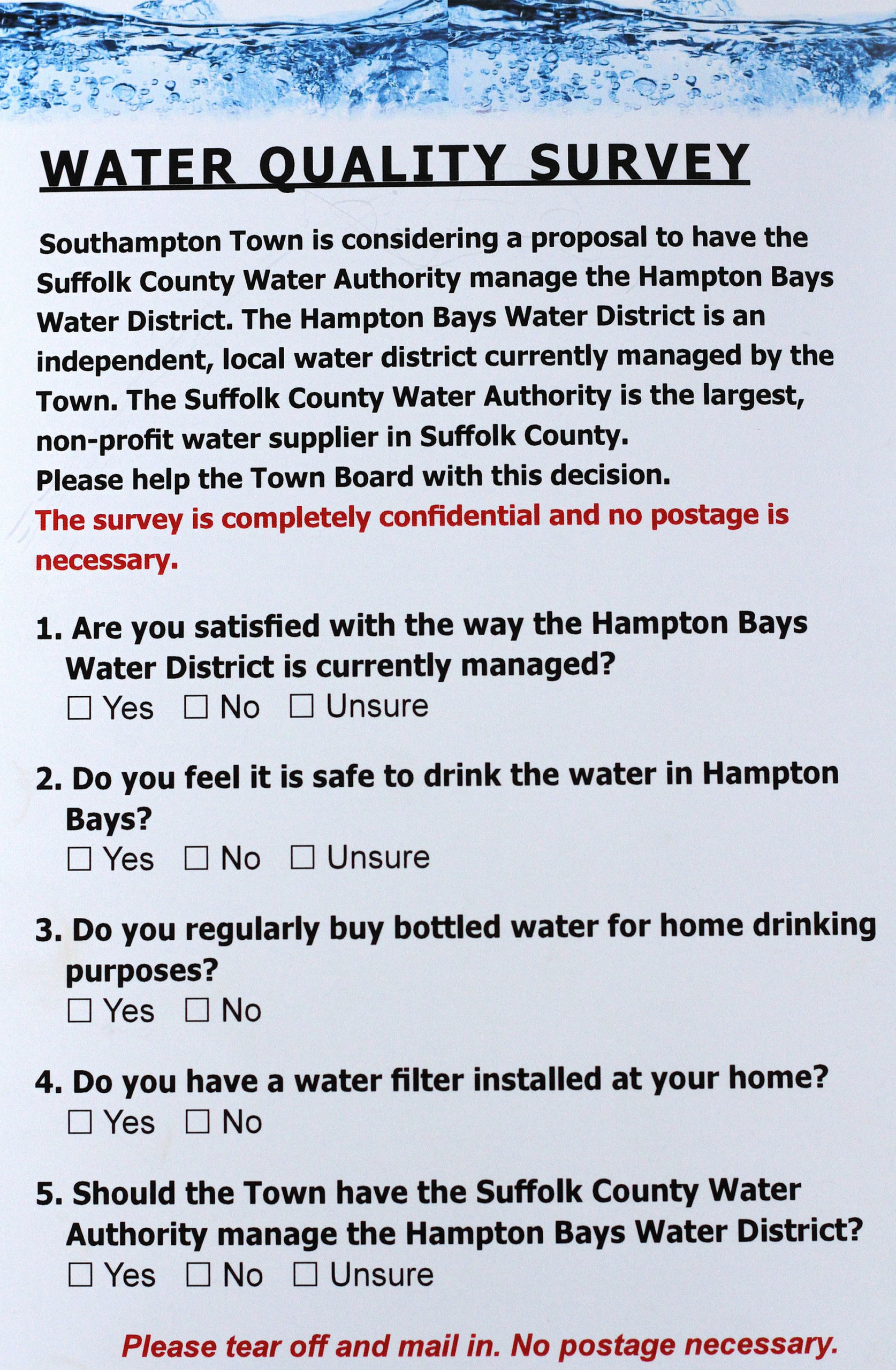Reaching A Boiling Point


Residents have continued to push for a referendum to keep their publicly-owned Hampton Bays Water District or hand over management duties to Suffolk County Water Authority. Now, they may get their wish, but it will all depend on results from public surveys.
A 10-question survey, which so far 400 of the hamlet’s 6400 residents have filled out, has been available on the town’s website for months. The town mailed a four-question assessment last month to homeowners, which asks if residents are satisfied with the water district, if they feel safe drinking their water, if they drink bottled water, and if they feel the water authority should assume control.
“We’re trying to gauge the level of satisfaction with the current service,” Southampton Town Supervisor Jay Schneiderman said. “If we see there seems to be an overwhelming majority of people who are in favor of handing over management, we’ll take it to a public vote. But if there’s enough people against it, we’ll stop the conversation here but will definitely have to make some infrastructure upgrades and changes going forward.”
The consideration of a public vote on the proposal came following the second of two town meetings with the board, the public, Hampton Bays Water District, and Suffolk County Water Authority December 18. At both meetings, a majority of those in attendance were in favor of residents maintaining control.
“Why would you give something up that you already own?” Hampton Bays Water District Superintendent Robert King asked. “In all fairness, the people should be able to vote, and to see so many people come out and support that idea and get behind us, it’s impressive.”
Relinquishing control was brought up after many lost trust following a 40-day delay in construction to fix problems in three wells after high levels of the toxic chemicals perfluorooctanesulfonic acid and perfluorooctanoic acid (PFOS and PFOA) were found in drinking water.
Recipients have Monday, January 14, to complete and return the return postage prepaid mailers. The results will be available on the town’s website, http://www.southamptontown.gov.
Citing $2.1 million in grant money Rockville Centre recently received for treatment, King said it gives him hope the town can handle the situation without requiring outside help, adding he’s thinking instead a potential agreement could be reached to send test samples to SCWA’s lab for faster results.
If there’s enough SCWA support to bring about a referendum, a resolution defining the details of any proposed management agreement and one or more public hearings would be required.
“We have to earn the people’s trust back,” King said. “Anything I say won’t do it. We didn’t put the chemical in the water, and people knew we had three wells down, which caused the dirty water. Once we got the wells up and running again, the dirty water went away, and we haven’t had any problems. Our reactions and how we handle certain situations from here on out will have to speak for us.”
Cuomo’s Bill Brings Relief
A law signed by Gov. Andrew Cuomo could relieve neighboring hamlets’ water woes. The bill, sponsored by Assemblyman Fred Thiele and state Senator Ken LaValle December 28 allows Community Preservation Funds be used in areas where “drinking water has been contaminated by toxic chemicals, hazardous substances, or emerging contaminants.”
The bill was in response to pollution in Wainscott — perfluorinated compounds (PFCs) were detected in more than 200 private wells. Health effects associated with the chemicals include liver damage, decreased fertility, developmental delays in fetuses and children, and possibly cancer, according to the U.S. Environmental Protection Agency.
On the same day he signed the bill, Cuomo signed another allowing some East End property owners to borrow money from the fund for septic system upgrades and to repay it through their tax bills. Quogue has had similar issues affording hookups following contamination in more than 40 wells. East Hampton Town and the Suffolk County Water Authority are nearing completion on 45,000 feet of new water mains, a project that is expected to cost $24 million.
“I think it’s great news,” Schneiderman said. “The resources are desperately needed to act expeditiously to get people safe, clean drinking water.”
desiree@indyeastend.com









